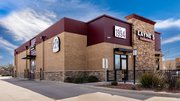Blog
The pay-as-you-go POSitives of renting your POS
State-of-the-art systems with effortless, problem-free updates and, in some cases, without the need for servers on-site or system-wide server farms are among the benefits QSR operators can realize when renting their POS systems.

November 6, 2017 by Christopher Sebes — president, Heartland Commerce
The ways we acquire, access and use technology have changed dramatically and rapidly in recent years and that is now affecting how QSR operators acquire point-of-sale systems. Traditional purchased POS systems involve some pretty hefty outlays of cash, along with maintenance and service contracts, upgrades and other obligations that might keep many busy quick-service leaders in systems that no longer serve their brands best.
But a new paradigm has come to the POS choice, just as it has for much of our personal technology. For instance, remember when just about all software or operating systems for our home computers had to be purchased upfront as a disc and installed? Contrast that with today when most of us acquire it through something like a subscription or rental model.
In this approach, we may pay something like $10 a month instead of pushing out an upfront amount of $250 since the internet now offers a beautifully simple way to distribute and purchase software securely. Since many software subscriptions come with regular updates, new enhancements are immediately available as updates or downloads, rather than disc installations.
The flexible freedom of pay-as-you-go POS
The rental POS model is making significant inroads into quick-service, and that has brought a completely different — and in my view — better experience to users who can take advantage of more affordable monthly payments and zero upfront costs, freeing up cash for capital expansion. Other benefits, include:
- Easier, less time-consuming software rental contracts.
- Installation often available as an app via cloud-based systems.
- Minimal required training via user-friendly software.
- Real-time, incremental, automatic, hands-free updates included in monthly fee.
- User’s choice of touchscreen device without ties to proprietary terminal hardware.
- Possibility of touchscreen devices that work with existing POS hardware.
- Possibilities for server-free and server farm-free options through POS systems that connect to (and through) the cloud.
On that last bullet point, restaurant operators should know that completely self-contained on-location systems are now available that offer the very significant benefit of allowing staff to continue to ring up sales and produce reports even when internet connections fail.
That’s a benefit that clearly will not only have your IT staff doing thankful back flips, but also the on-site staff and customers will walk away with good experiences all the time, instead of periodically taking away an experience involving the stress, long lines and overall inconvenience that downtime can produce, wreaking havoc on your QSR brand.
Photo: iStock
About Christopher Sebes
Christopher Sebes has spent his entire career in hospitality management and technology. He received a degree in Hotel and Restaurant Management in England and managed hotels and restaurants on three continents including multi-unit restaurant operations in Europe and the US. He created the first Microsoft Windows point-of-sale company, Twenty20 Visual Systems, which he sold to Radiant Systems. He went on to become the CEO of Progressive Software before founding XPIENT in 2004. XPIENT was sold to Heartland Payments Systems in 2015, and he was tapped to become the President of Heartland Commerce, a major player in restaurant and retail management technology. Today Christopher is the President of Xenial Inc., formerly known as Heartland Commerce.
 ChatGPT
ChatGPT Grok
Grok Perplexity
Perplexity Claude
Claude








